|
|
|
Sort Order |
|
|
|
Items / Page
|
|
|
|
|
|
|
| Srl | Item |
| 1 |
ID:
130736
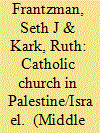

|
|
|
|
|
| Publication |
2014.
|
| Summary/Abstract |
This paper traces the history and development of Catholic real estate ownership in Palestine/Israel, uses of the properties, and the impact on the physical and cultural landscapes and on identity formation of the local population. It takes a long-term perspective, beginning with the return, after a short absence, of the Franciscans to the Holy Land in the fourteenth century and ending with the present position of the Catholic Church and the properties of its various sects and orders. It examines the history of the Catholic Church in Palestine/Israel under the Ottoman, British, Jordanian, Egyptian and Israeli regimes. In contrast to the large body of existing scholarship on the Catholic Church in the Holy Land, this examination of the local history of the Catholic Church views it through the prism of land ownership and properties. The landholdings of the Catholics are compared and contrasted with findings of previous studies by authors on those of the Greek-Orthodox and Anglican churches. Special attention is paid to the differences in frameworks, functions and geographic dispersal of the church organs, such as monasteries and educational institutions as well as the property of the local Arab Greek-Catholics. The article also examines the effect of Arabization of the Catholic clergy in relation to the lands owned by the Catholic Church and finds that, unlike other churches in the Holy Land, the Catholic Church has not generally experienced ethnic-related dissent over property.
|
|
|
|
|
|
|
|
|
|
|
|
|
|
|
|
| 2 |
ID:
132408
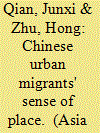

|
|
|
|
|
| Publication |
2014.
|
| Summary/Abstract |
In this paper, we study urban migrants' sense of place in Guangzhou, China, focusing on the structural relations between place attachment, identification and dependence as the three key place dimensions. Through both quantitative structural equation modelling and qualitative analysis of in-depth interviews data, our research suggests that migrants' sense of place demonstrates complex relationships between the three registers of emotional attachment, identity formation and functional dependence. The construction of sense of place is also related to the personal experiences of living as urban 'outsiders'. Our research also reveals a striking difference between the city and community levels in terms of the ways in which migrants' sense of place is constructed. Urban migrants tend to exploit the functional utilities of microscopic urban spaces to meet their demands for recreation, education and socialisation. On the other hand, their sense of place to the city is largely compromised by their attachment to the hometown and conditioned by their personal identification to the city.
|
|
|
|
|
|
|
|
|
|
|
|
|
|
|
|
| 3 |
ID:
073666
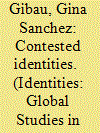

|
|
|
|
|
| Publication |
2005.
|
| Summary/Abstract |
This article presents the case of Cape Verdeans living in Boston, Massachusetts, as a community faced with the dilemma of constructing social identities within a racialized society. The Cape Verdean diaspora community of Boston is one that is fragmented into two distinct sectors of "Cape Verdean Americans" and "Cape Verdean immigrants." Through an analysis of "identity narratives," this article illustrates how Cape Verdeans' diasporic identity formation is constructed out of processes of negotiation and contestation. In determining whether Cape Verdeans living in Boston associate more with their cultural group or other larger racialized groups whom they resemble (e.g., African-Americans, Latinos), this article reveals how diasporic identities are not merely a given, but are a matter of heated debate. The Cape Verdean diaspora of Boston provides an interesting example of how immigrants of African descent are actively reshaping the boundaries of racial categories by creating a space for cultural differentiation. The self-identification practices of Cape Verdeans are not unlike those of many other racially and ethnically defined immigrants in the United States, who continue to relocate to the United States, permanently or temporarily, due to personal choice, economic necessity, political persecution, ecological escape, and familial reunification. This article demonstrates how racial and ethnic categories are expanding and thus challenging our common sense notions of race, ethnicity, and culture.
|
|
|
|
|
|
|
|
|
|
|
|
|
|
|
|
| 4 |
ID:
157948
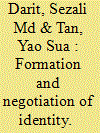

|
|
|
|
|
| Summary/Abstract |
This article examines the formation and negotiation of identity among the Kampung Pasir Parit Peranakan Chinese, a unique sub-ethnic group of acculturated Chinese in Kelantan. Apart from their original Chinese identity, the Kampung Pasir Parit Peranakan Chinese have also adopted two additional identities, namely Malay and Siamese identities. Intermarriage with Siamese women in the early years is the main reason for the adoption of the Siamese identity, while regular social interactions with the local Malays have led to the adoption of a Malay identity. Thus, the identity of the Kampung Pasir Parit Peranakan Chinese comprises three contrasting components. Given such a complex identity, there is always a need for the Kampung Pasir Parit Peranakan Chinese to negotiate their identities to avoid any identity crisis. This negotiation of identity is at times demonstrated by the co-existence of identities and at times the clear demarcation of identities to fulfil different situational needs.
|
|
|
|
|
|
|
|
|
|
|
|
|
|
|
|
| 5 |
ID:
147661
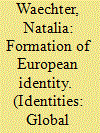

|
|
|
|
|
| Summary/Abstract |
Research into European identity has mostly focused on majority populations in Western European countries, neglecting new member states in Central and Eastern Europe (CEE) as well as ethnic minority groups. This paper contributes to filling this gap by exploring and investigating processes of European identity formation of five ethnic minority groups in four CEE countries. A generational perspective was applied by conducting qualitative in-depth interviews with three generations of ethnic minority group members. The results support the instrumental approach of identity construction. In all minority groups researched, the young generation, due to more positive personal experiences and perceived benefits from the European Union, have developed more positive images and perceptions of Europe and a greater sense of European identity than older generations. Furthermore, ethnic group-specific processes of identity formation were found.
|
|
|
|
|
|
|
|
|
|
|
|
|
|
|
|
| 6 |
ID:
187069
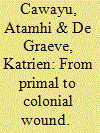

|
|
|
|
|
| Summary/Abstract |
This paper provides a critical analysis of the narratives of Bolivian adoptees in Belgium. We discuss how the adoptees look back upon the imagery of family and culture invoked by their parents and wider social environment and how this imagery has affected their sense of self and belonging. We argue that the adoptees’ narratives testify of a discursive struggle to reclaim control over their lives and histories. While they draw upon prevailing discourses that tend to imagine adoptees as ‘wounded’, they do so in diverse, complex and at times contradictory ways. Their perceptions of the familial and cultural imagery show that while they do not entirely reject the idea of being hurt, they seem to make a shift from explaining this ‘wound’ in individual-psychological terms to explaining it in social terms, making use of emerging anti-racist and decolonial perspectives.
|
|
|
|
|
|
|
|
|
|
|
|
|
|
|
|
| 7 |
ID:
172223
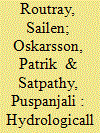

|
|
|
|
|
| Summary/Abstract |
This article analyses how long-running, multilayered conflicts over water at the Hirakud dam underpin present-day societal divisions in Odisha state. There are four unresolved conflicts over this dam in the state: movements against displacement, movements for rehabilitation, struggles between agricultural and industrial water users, and, finally, disputes between federal states. These have generated societal ruptures from the announcement of the dam in 1946 to the present day. We argue that understanding the confluence and ingrained, overlapping character of these conflicts provide important vantage points for understanding the present uneasy constitution of subregional state fabrication in Odisha.
|
|
|
|
|
|
|
|
|
|
|
|
|
|
|
|
| 8 |
ID:
106275
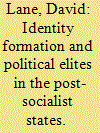

|
|
|
| 9 |
ID:
096873
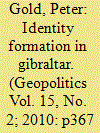

|
|
|
| 10 |
ID:
089794
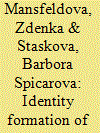

|
|
|
|
|
| Publication |
2009.
|
| Summary/Abstract |
The European Union (EU) and the concept of creating a new supranational political institution has been going through an unusually dynamic period of development in recent years. It has to do not only with the admission of a large number of new member in a very short period of time, but also with projects designed to deepen integration.
|
|
|
|
|
|
|
|
|
|
|
|
|
|
|
|
| 11 |
ID:
160113
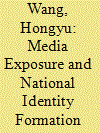

|
|
|
|
|
| Summary/Abstract |
Using survey method, this study compares the relative importance of exposure to Chinese media, pro-China local media, pro-democracy local media, and new media (e.g., Weibo, Facebook) on the building of national identity among Macau college students. We argue that the effect of media exposure on national identity formation is not uniform, owing to the political leanings of the media and the platform on which the information is transmitted (new media vs. traditional media). We find that getting news about China on Facebook is the most important predictor of the formation of national identity among college youth in Macau, followed by getting news on Weibo and exposure to traditional Chinese media. Conversely, exposure to pro-democracy local media and frequent use of Facebook exert a negative effect on national identity building among college youth in Macau. Positive sentiment toward China and trust in the central government act as mediators and fully explain the relationship between exposure to traditional pro-China media and national identity but cannot explain the positive effect of exposure to new media on national identity formation.
|
|
|
|
|
|
|
|
|
|
|
|
|
|
|
|
| 12 |
ID:
113791
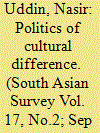

|
|
|
|
|
| Publication |
2010.
|
| Summary/Abstract |
This article analyses the formation of an ethnic category and its relations with the marginalisation of ethnic minorities in the context of upland-lowland relations in Bangladesh. Three central concerns are highlighted. First, it examines the political and historical trajectories of the South Asian subcontinent which has laid down various identities for groups of people such as the Pahari living in the Chittagong Hill Tracts (CHT) of Bangladesh. Second, it critically discusses how colonial policy has continued in the postcolonial era, particularly in dealing with people of different cultures living in the same state's territory. Finally, the article argues that identity formation is closely linked with the politics of marginality, with particular reference to the Pahari people of the CHT. The article is based on comprehensive data collected through ethnographic fieldwork undertaken at different times from 1997 onwards.
|
|
|
|
|
|
|
|
|
|
|
|
|
|
|
|
| 13 |
ID:
106926


|
|
|
|
|
| Publication |
2011.
|
| Summary/Abstract |
This article argues that constructivists committed to reflexivity should be students of the future. It notes that both conventional and critical approaches do not sufficiently engage with the problem of future uncertainty in the process of identity formation and neglect its behavioural implications. Against this backdrop, the article regrounds constructivism in a temporal ontology and the argument that humans, in the face of contingency, seek to establish visions of a meaningful future. It discusses how visions, as utopias and/or dystopias, define possibilities of being and thereby provide actors with a sense of direction, and it differentiates between "robust" and "creative" visions to highlight two ways in which such possibilities are manifested. In doing so, the article encourages constructivists to become more attentive in identifying the visions which enable and bind creative agents in the process of realization.
|
|
|
|
|
|
|
|
|
|
|
|
|
|
|
|
| 14 |
ID:
084383
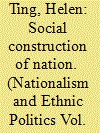

|
|
|
|
|
| Publication |
2008.
|
| Summary/Abstract |
In this article, the term "nation" is understood as a mental construct, and the formation of national identity as a dynamic, contentious historical process of social construction. Using the concept of "figured world of nationhood," I discuss how the subjective, collective perception of the "objective," virtual reality of a nation is (re)constituted and negotiated through social practices. In the same process, actors come to increasingly identify with and commit themselves to this "figured world of nationhood." The agency of social actors involved is differentiated according to the respective "social field" of their action.
|
|
|
|
|
|
|
|
|
|
|
|
|
|
|
|
| 15 |
ID:
125406
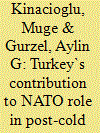

|
|
|
|
|
| Publication |
2013.
|
| Summary/Abstract |
After the Cold War, NATO formulated its role new role on the basis of broader political aims and new security objective by assuming crisis management operations beyond its borders. This article argues from a constructivist perspective that keen Turkish involvement in NATO out of area operations constitutes a context of social interaction that has led to particular identities and certain security policy outputs for both. Turkey`s participation in NATO`s military operations as the sole Muslim ally, in the post-cold war era, enabled NATO to build an identity as a global security actor in crisis management while turkey`s active role in these operations served to keep Turkey`s sense of prominence in the protection of the universal values and, thus, its claim to western identity.
|
|
|
|
|
|
|
|
|
|
|
|
|
|
|
|
| 16 |
ID:
101487
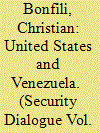

|
|
|
|
|
| Publication |
2010.
|
| Summary/Abstract |
US-Venezuelan relations dramatically worsened under the Bush and Chávez administrations. Notwithstanding, evidence suggests that increasing polarization has not weakened mutually beneficial economic ties. How can we account for the co-existence of interdependence and antagonism? In addressing this question, this article examines both the economic/energy and the political/strategic sectors of bilateral interaction. It argues that the co-existence of interdependence and antagonism needs to be understood within the wider context of two simultaneous yet divergent constellations of socially constructed perceptions, identities, and practices. While the constellation driving political/strategic interaction has revealed the internalization of role identities reflecting rivalry, the one guiding energy interaction has been sustained by role identities reflecting partnership based on interest. Significantly, the former has not taken over the latter, as the lack of shared threat perceptions relative to energy interdependence is the result of deeply internalized identities and a highly institutionalized social process. As a corollary, neither of these constellations has come to govern overall US-Venezuelan relations, and thus co-existence will most likely endure unless energy interdependence becomes the object of processes of constructing threat perceptions.
|
|
|
|
|
|
|
|
|
|
|
|
|
|
|
|
|
|
|
|
|